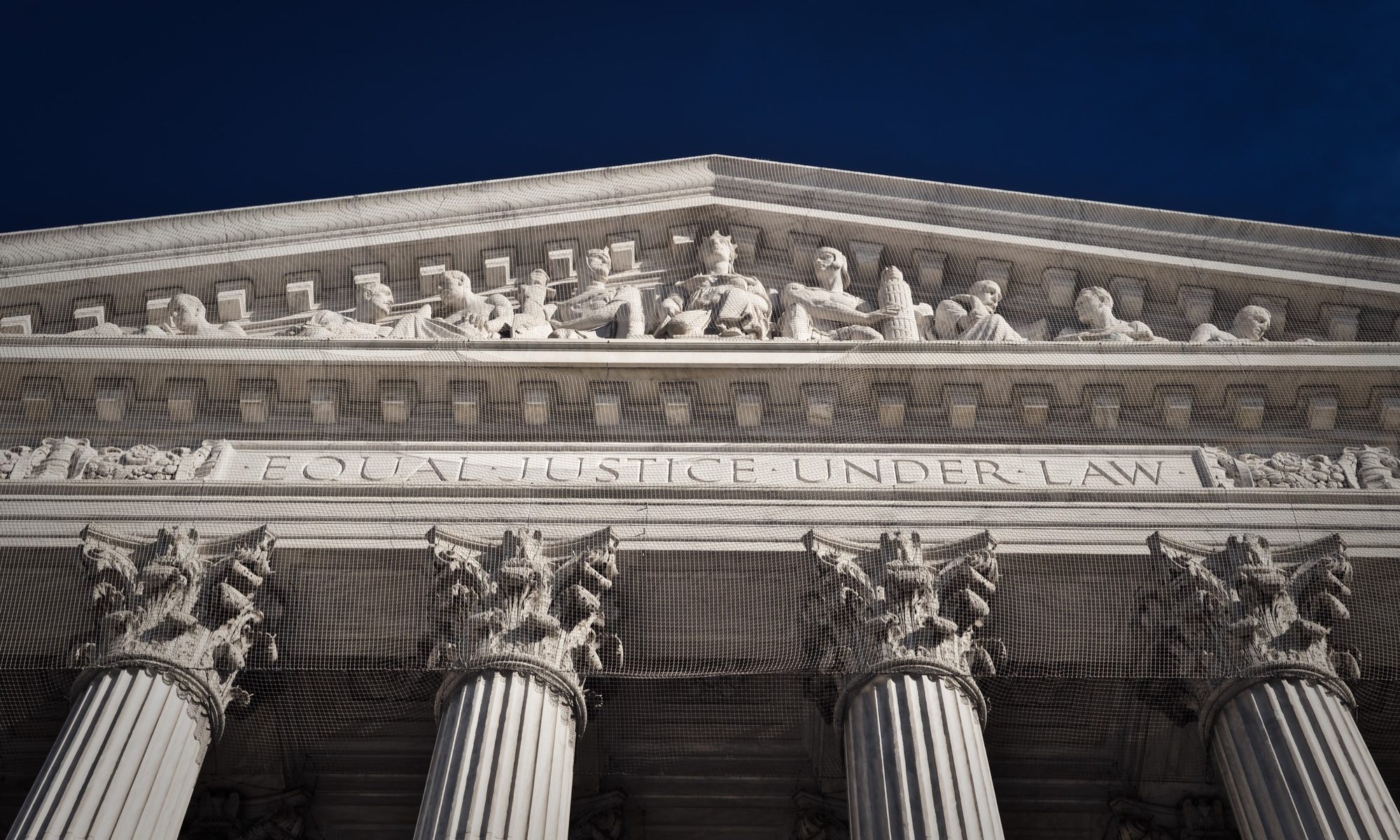Representative Alexandria Ocasio-Cortez has called for reforms to the Supreme Court of the United States (SCOTUS), specifically increasing the number of justices. The reforms are needed, she says, because of the rightward tilt of decisions over the past year including Dobbs v. Jackson Women’s Health Organization (abortion) and 303 Creative LLC v. Elenis (public accommodations and discrimination). On CNN she claimed that if reforms do not occur, then SCOTUS will function “without any check on their power, without any balance on their power, then we will start to see an undemocratic and, frankly, dangerous authoritarian expansion of power in the Supreme Court.” The opinion pages of major journalistic outlets like The Washington Post include similar views decrying judicial behavior.
To assess the need for reform and effectiveness of potential solutions, we must first determine what it would mean to have a properly functioning judicial system. One way to evaluate our social and political institutions is through John Rawls’s constructivist lens presented in his seminal work A Theory of Justice (and elsewhere). Rather than starting with a specific (and contentious) ideal, we tie our conception of proper functioning to the product of particular processes. As Carla Bagnoli describes it, constructivism is a view that “insofar as there are normative truths, they are not fixed by normative facts that are independent of what rational agents would agree to under some specified conditions of choice.”
To make sense of this description I like to think about where constructivism fits into a picture of objectivity and subjectivity. At one end we have facts — statements such as “the cat is on the mat” — whose correctness is determined by a set of referents independent of any human observer. As long as there is a mat, there is a cat, and the two objects have the right kind of relationship, the statement is either correct or incorrect. This is a realist view in which there are objective truths to be discovered in the world. But moral, political, and legal decisions are different from such prosaic examples. So, some have argued that normative statements are mere matters of opinion, lack truth value, and may be little more than non-cognitive expressions of emotion like “SCOTUS decision — Boo!” or “SCOTUS decision — Huzzah!” In other words, there is no objective truth whatsoever to Rep. Ocasio-Cortez’s evaluative claim that SCOTUS is involved in “a dangerous creep toward authoritarianism.”
Constructivists attempt to locate themselves in between realist views and non-cognitivist views. In constructivist views, statements about morality, politics, and the law have independence from individual human beliefs and emotions, and thus they have a claim to being objective. But the truths in these normative domains are not discovered facts, as a realist would claim. The truths are created by a combination of the rules of the game which we construct, and the facts as they occur as we play the game.
What does this have to do with SCOTUS? Rawls makes a distinction between different types of games we can be playing in political arenas. The difference between these games is the nature of the procedures used to identify evaluative truths. One of these games involves imperfect procedures; another game uses pure procedures.
Imperfect procedures start with the assumption that there exists an independent criterion concerning what constitutes a correct answer, but that the practices available to an investigator do not guarantee that the correct answer will be identified. Rawls uses a jury trial as an example. Lawyers use the adversarial method to convince a jury of peers that the accused either is or is not legally guilty. But those who are watching often want a verdict to express not legal guilt but something more — namely did the accused actually act in a way that warrants a conviction or acquittal. As Rawls puts it, in a jury trial using the adversarial method, “[e]ven though the law is carefully followed, and the proceedings fairly and properly conducted, it may reach the wrong outcome.” The existence of the appeals procedure, and the work of organizations like The Innocence Project, suggests that the adversarial method does not guarantee the correct answers.
Alternatively, the major difference with a pure procedure is that a pure procedure does not assume the existence of an independent reality and criterion for what constitutes a correct answer. Instead, the procedure itself, when run, constructs the correct answer. An example of such procedures is a bracket procedure used in professional tennis tournaments. There is no answer to the question “who is the best women’s player at Wimbledon in 2023?” until the tournament is finished. Iga Swiatek may have been ranked number one in the world and the number-one seed at Wimbledon, but before the tournament finished, there was no answer to the question. Now that the tournament is over, we can answer the question: Markéta Vondroušová is the best women’s player at Wimbledon in 2023, despite being unseeded at the beginning of the tournament.
If we want to know whether SCOTUS or the other federal courts are functioning properly or in need of reform, we need to determine what type of procedure governs the practices of the courts and see whether SCOTUS is behaving in accordance with these conceptions. Begin with the following question: Is SCOTUS supposed to be operating in a manner consistent with imperfect procedural justice?
At first glance, that seems to be the case. Decisions made by SCOTUS are supposedly constrained by several independent criteria. First, the content of the U.S. Constitution, especially the Bill of Rights, is supposed to be an independent constraint on their rulings. SCOTUS can’t ignore issues of due process. SCOTUS and the legislative bodies have the ability to shape the nature of due process, but the Fifth Amendment requires that certain rules are followed. Next is the concept of standing which requires a plaintiff to have an interest that is violated, an “injury-in-fact.” This keeps the court from making decisions based on hypothetical cases of legal injury. There is also the concept of stare decisis, the idea that courts should honor precedent to create a predictable and consistent legal system (see here).
A Supreme Court justice that had this many constraints and attended to them should, as Chief Justice John Roberts stated in his confirmation hearing, see their “job as to call balls and strikes.” In other words, the role of a justice is to look at the facts of a case and consider the independent constraints of precedent, statutory laws, and constitutional laws, and merely make a judgment about the truth in the case.
Has SCOTUS lived within these constraints? Some have argued that the Plaintiff Lorie Smith did not have standing in 303 Creative LLC because a) no one asked her to make a website for a wedding between two people of the same sex, and b) no state agency invoked the Colorado Anti-Discrimination Act in legal action against her. She suffered no injury-in-fact. Further, given that Dobbs overturned an almost 50-year-old precedent in Roe v. Wade and SCOTUS overturned decades of precedent in Students for Fair Admissions, Inc. v. President and Fellows of Harvard College, there is reason to believe that the court is not abiding by stare decisis. Admittedly, stare decisis is not an absolute constraint, otherwise the ruling of Brown v. Board of Education would also be problematic. However, given the current willingness to claim that a previous case was wrongly decided despite being upheld by other decisions suggests it is currently no constraint at all.
Next, consider that Marbury v. Madison reinforced the concept of judicial review – the Court can invalidate laws and statutes considered inconsistent with the Constitution. Judicial review is effectively the power to interpret the prevailing legal institutions, especially the Constitution, to justify decisions. So, it is not simply the Constitution, but a justice’s interpretation of that document, that is operative in justifying SCOTUS decisions. Ultimately, a justice issues guidance as to the correct answer according to how their particular interpretive lens (originalism, contextualism, legal pragmatism, etc.) makes sense of the facts of the case. But that means the Constitution is not, by itself, an independent constraint on judicial decisions either.
In short, it is not clear that there are constraints on SCOTUS, so it looks like we should not see it as using imperfect procedures.
Does SCOTUS instead operate according to a pure procedure? It might seem so since we don’t really know the correct answer to a legal question until SCOTUS rules. The process of appealing a lower-court decision, SCOTUS hearing the case, and making a decision settles the matter. Pure. Procedure. So, on this view, SCOTUS in Dobbs, 303 Creative, etc., is functioning as it should, and the basis for criticizing the Roberts Court as radical, activist, illegitimate is questionable, as is the call for reform.
But it is important to note that SCOTUS is not like Wimbledon. Tennis tournaments have rules that are drawn up by one group of people, while another group of people act as judges during matches. The procedure — the bracket — then develops based on the actions of the players as overseen by the judges. This is decidedly different from how the Supreme Court currently operates. Between choosing judicial interpretive lens, interpreting the rules of standing, determining whether stare decisis should be honored, SCOTUS is fundamentally not like these sports tournaments. When a case comes before SCOTUS, the justices can act as both the umpires and the rules committee. They make choices about the relevant rules and their application after the legal competition has begun. In sports, all of these decisions are made and publicized prior to the first match. So, in very important ways, SCOTUS operates in a way that is not even consistent with a paradigm example of a pure procedure. In other words, these are not decisions created by a combination of the rules of the game which we construct, and the facts as they occur as we play the game. They are also constructed by those who are changing the rules as the game proceeds.
If we accept the above, then recent decisions show the Court is functioning as designed, but perhaps not functioning as we want. The decisions are not discovered by an imperfect procedure; they are not created by a pure procedure. Instead, they are the result of something else, such as expression of political power. So, what can be done? When evaluating institutions, Rawls would have us ask “is this how a group of rational individuals, unaware of their own biases or even personal characteristics, would design the rules of a judicial system?” If the answer is “No! This is not the design we want,” will increasing the number of judges fix the problem? Unfortunately, increasing the number of justices, as Ocasio-Cortez suggests, will not make the court function properly — it will simply shift the balance of power. Instead, what is needed are enforceable constraints on the decisions of justices so that SCOTUS operates more like a sporting event and less like a pure exercise of political power.
The author would like to acknowledge the help of his colleague Dr. Dominic DeBrincat, Professor of History.



